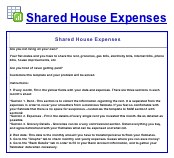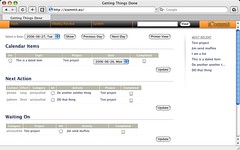Merlin’s weekly podcast with Dan Benjamin. We talk about creativity, independence, and making things you love.
Our Most Popular PostsHow do you describe Quicksilver?Merlin Mann | Sep 30 2007Acting without doing SOUNDS good, but... (Ask MetaFilter) I really liked this AskMe question about Quicksilver, since it's one that comes up a lot for folks who don't get as enthused about the app as I (and many of you) do:
Here's a portion of how I responded in comments: read more »52 Comments
POSTED IN:
What text files do you use?Mitch Wagner | Jan 29 2008I started keeping text files of ideas a year or two ago, but the system quickly collapsed due to its own complexity. I am a journalist and a blogger, and so I started out with three files. -- blog ideas and article ideas. I also had a file called "inbox" for random thoughts, most of which would get turned into GTD next actions. The first difficulty I encountered was that it wasn't always clear, up front, what's going to turn out to be a blog, and what will be an article. Back then, I went by gut feeling, now I think I have some good thumb rules -- but either way, this decision should not be made at this stage of the process. read more »POSTED IN:
Solving problems outside your comfort zoneMerlin Mann | Oct 10 2007I sometimes think that one factor in success as a business or as a human being has a lot to do with what kind of problems you're comfortable solving -- and how you get better at addressing the stuff that falls outside that comfort zone. History is littered with revolutionaries who couldn't run the country they'd overthrown, Generals who've insisted on re-fighting the last war, talented programmers who were promoted to becoming ineffective (and very unhappy) managers, and, of course, there's the countless companies that just couldn't make the leap when technology or cultural change rendered their comfy old business model moot. Seems like there's a thread here that's worth thinking about. How do you get better at knowing when you’re trying to solve the wrong problem? read more »POSTED IN:
WWLD? No. 3: Organizing your environmentLance Arthur | Nov 28 2007
1. A place for everything.This has been an especially valuable lesson for me. It's easy and common to toss your keys and wallet somewhere when you enter your home. If you're not tossing them in the same place every time, the next time you're about to leave and need your keys to get back inside, you may not remember where it was you tossed them -- or maybe you left them in a pocket without tossing them at all, but which pocket was it? What were you wearing, and where is that article of clothing now? read more »POSTED IN:
The War of Art, and JoCo on becoming a "true person"Merlin Mann | Mar 8 2007007: Interview: Jonathan Coulton, Part 2 | The Merlin Show I first heard about The War of Art from David Allen during our GTD podcast series last year. I finally picked up a copy a couple months back and read it in an evening. Like a lot of self-help books, it's longer than it needs to be (and it's not actually very long to begin with), but it does make some great points about what its author calls "resistance." Resistance can be thought of as anything that pulls us away from doing the work we know is most important to us. It takes many forms (including procrastination, fear, distraction, and negative self-talk), but the effect is often similar: we find or permit all kinds of barriers to keep us from becoming the person we want to be, or from completing the thing we really want to make. Whether that's being a published author, a composer, a playwright, or a painter, our impulse to create constantly battles an impulse to do something else, or to do nothing -- to not upset our weirdly comfy stasis. This book came up twice in my recent interview with Jonathan Coulton; both in part one and today's recently released part two. Jonathan strikes me as someone who has, so far, succeeded at talking down the resistance he'd faced, and now he's doing what he's great at, and, in his words, he's working hard to become the kind of "true person" that he wants to be for his daughter. read more »POSTED IN:
Foo for Bar: Kicking Ass with Outcome-Based ThinkingMerlin Mann | Aug 8 2008The other day, I was talking with someone who is trying to encourage a Getting Things Done-like work approach amongst the people on his team. We started talking about which parts of David Allen's GTD system appear to have the greatest long-term impact on the people who have adopted it and who ultimately stick with it for years. When asked to distill everything down to its most powerful concepts, I came up with three, and here's how I'd summarize each:
While I think stuff like ubiquitous capture, the Natural Planning Model, the Two-Minute Rule, and many other bits are arguably as important, these are the three things that I feel have the biggest impact on how people's results change over time. read more »POSTED IN:
43f Interview: GTD's David Allen on the "Someday Maybe" listMerlin Mann | Oct 16 2006
Productive Talk #03: Someday Maybe 43 Folders and The David Allen Company present the third in a series of conversations that David and Merlin recently had about Getting Things Done.
Grab the MP3, learn more at Odeo.com, or just listen from here: read more »POSTED IN:
Google Docs Adds Over 300 New TemplatesMerlin Mann | Jul 17 2008
My favorites are in the eclectic "Miscellaneous" section, where you'll find templates for athletes, parents, wedding or event planners, wine nerds, screenwriters -- even "animal guardians". read more »POSTED IN:
iCommit: PHP app for doing GTDMerlin Mann | Jun 27 2006Getting Things Done [iCommit.eu] Rainer Bernhardt has put together a nifty little PHP app for doing GTD via a web interface. It lets you wrangle projects, next actions, calendar items, ad hoc lists, and all the other tactical building blocks of GTD all via your (non-IE) browser. The interface is pretty good and typical workflow is quite easy to navigate through. It has nice touches like attachments, per-item effort estimates, printable views, plus Rainer says he may soon offer email integration which would "eliminate use of a separate e-mail app" for workflow-related planning. Wow. Although I haven't spent a great deal of time with it, I'm very intrigued by the baked-in "weekly review" functionality, which walks you through most of what you need to look over each week from one interface. Since review gets short shrift from the many folks (like me) who use GTD primarily for task management, I think an addition like this is a terrific idea. iCommit is, like so many of my favorite apps these days, a non-commercial, one-man operation, so there are a few rough edges, no documentation (yet! coming soon, says Rainer), and it is very much "first come, first served" in terms of seats he can handle on his personal server setup (I hope we don't cream Rainer's productivity boxen with this). But iCommit is worth a look if you've been craving a cross-platform, low-paper implementation of Getting Things Done. Screengrabs below the cut -- I feel like Michael Arrington! read more »POSTED IN:
Guest post: Scott Andrew on "Productivity for the Practicing Musician"Merlin Mann | Nov 7 2005Some time back, mathowie poked me about talking to our pal, Scott Andrew, about some of the productivity mojo he uses to keep his one-man acoustic pop army in line. Turns out that, in addition to being a terrific singer/songwriter, Scott’s got a mature system for booking gigs, promoting his work, and maintaining a lively relationship with his many fans. Although there are tips here that will be useful to everybody (keep it simple; fear not lofi; provide great customer service), the musicians, artists, and other performers out there will most especially learn from what Scott’s got going on; as my friend Sean is fond of saying (in a booming, fakey showbiz-guy voice): "It's not music 'friend'; it's music business!" Productivity for the Practicing Musicianby Scott Andrew When Merlin approached me about writing a sort of “Getting Music Done” piece, I initially thought: buh? I’m probably the worst model for artistic productivity. After mulling it over, it occurred to me that I’m probably a very typical model. I have a day job. I have rent. I write songs on a used thriftstore guitar and record them when I can scrape enough gig money together. I spend my creative life in that emotional DMZ between self-assured, passionate DIY ferocity and vague, nagging career dissatisfaction. In other words, I’m just like most aspiring musicians. Perfect! So don’t please look on this article as advice from someone who’s “been there” — I’m still getting there. I once read a rant by a punk musician who complained that if he had the time and ability to do all the stuff needed for a rewarding music career, he wouldn’t need a record deal. Well, yes. The unsexy truth is that some days you’ll feel more like a Post Office than a rock star. This pisses off some people who’d rather be working on, like, music, instead of bookings or publicity. But that’s okay, because the worst that can happen is: nothing happens. Eventually you get tired of nothing happening, and you resign yourself to the “business” side of the music business. Sigh. read more »POSTED IN:
|
|
| EXPLORE 43Folders | THE GOOD STUFF |
 Our
Our 


